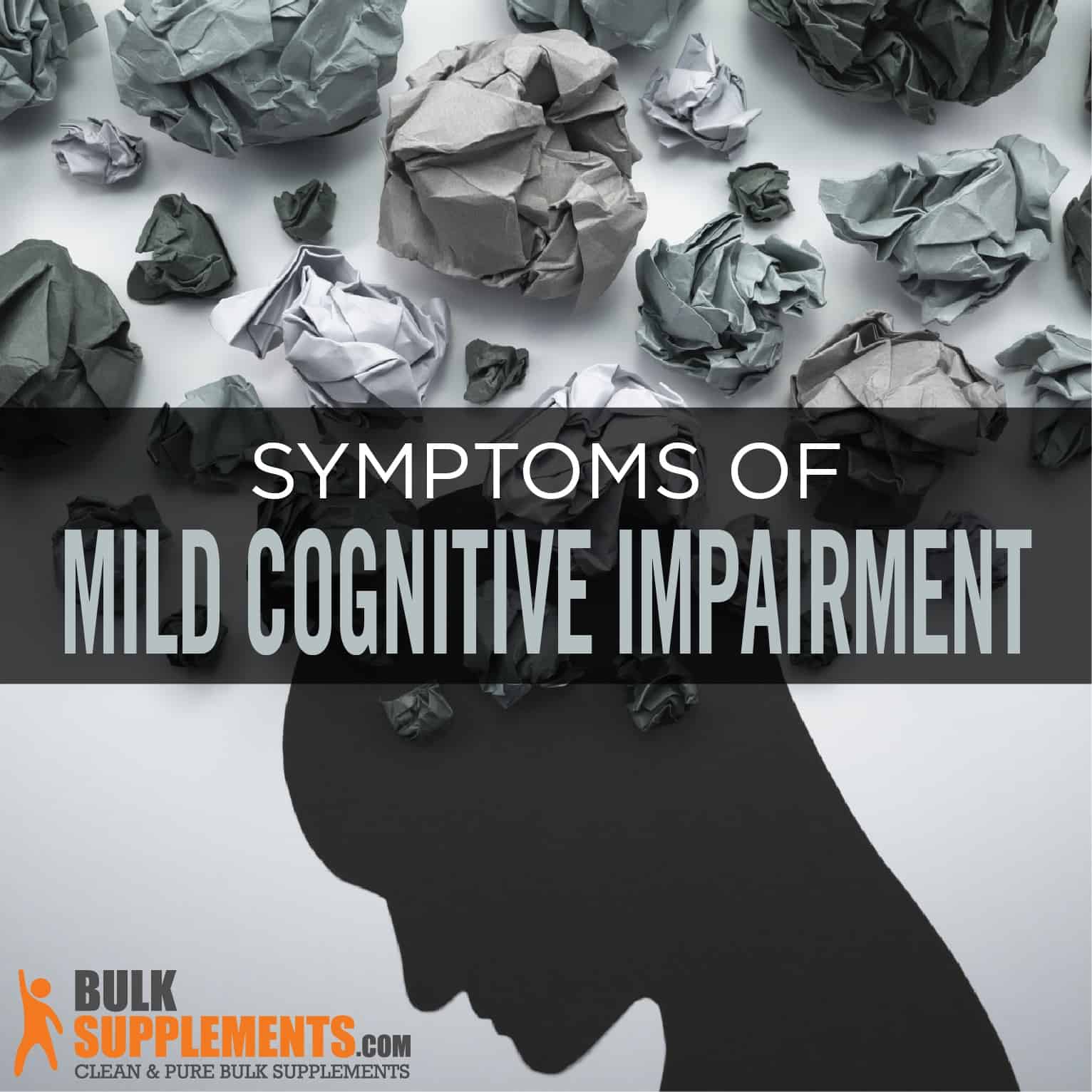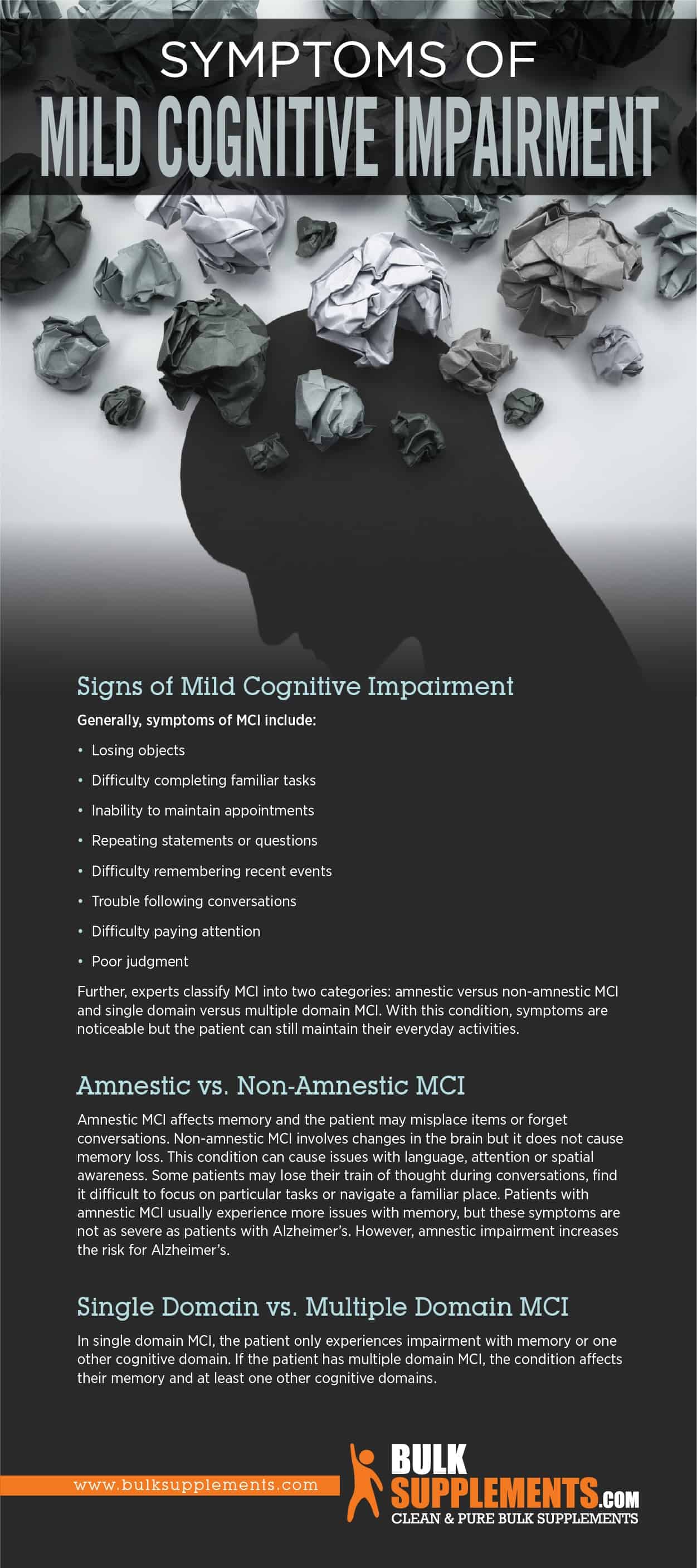Mild Cognitive Impairment (MCI): Causes, Signs & Treatment
by James Denlinger Digital Marketing Strategist
What Is Mild Cognitive Impairment (MCI)?
Mild cognitive impairment (MCI) is a medical condition that affects a patient’s cognitive abilities. It interferes with memory, language, thinking and judgment. Patients with MCI usually struggle to perform cognitive related tasks, but sometimes these symptoms are not severe enough to interfere with daily activities. As patients age, it is normal to experience changes in cognition. Patients develop conditions like Alzheimer’s disease and other types of dementia gradually. MCI is one stage before mild to severe dementia.
Research estimates that about 5 to 20 percent of patients over the age of 65 struggle with MCI. And although it is not a form of dementia, patients with MCI are more likely to develop dementia and other forms of the disease than patients without it. However, not all cases manifest in dementia. For some patients, the condition may stabilize. There are also cases where medication can trigger cognitive impairment if the condition is diagnosed incorrectly.
Signs of Mild Cognitive Impairment
Generally, symptoms of MCI include:
- Losing objects
- Difficulty completing familiar tasks
- Inability to maintain appointments
- Repeating statements or questions
- Difficulty remembering recent events
- Trouble following conversations
- Difficulty paying attention
- Poor judgment
Further, experts classify MCI into two categories: amnestic versus non-amnestic MCI and single domain versus multiple domain MCI. With this condition, symptoms are noticeable but the patient can still maintain their everyday activities.
Amnestic vs. Non-Amnestic MCI
Amnestic MCI affects memory and the patient may misplace items or forget conversations. Non-amnestic MCI involves changes in the brain but it does not cause memory loss. This condition can cause issues with language, attention or spatial awareness. Some patients may lose their train of thought during conversations, find it difficult to focus on particular tasks or navigate a familiar place. Patients with amnestic MCI usually experience more issues with memory, but these symptoms are not as severe as patients with Alzheimer’s. However, amnestic impairment increases the risk for Alzheimer’s.
Single Domain vs. Multiple Domain MCI
In single domain MCI, the patient only experiences impairment with memory or one other cognitive domain. If the patient has multiple domain MCI, the condition affects their memory and at least one other cognitive domains.

Causes of Mild Cognitive Impairment
Currently, researchers do not completely understand what causes mild cognitive impairment. For some patients, the condition could be a pre-dementia condition, so the patient may need to take precautions. Most patients’ symptoms usually worsen over time and the condition can transition from MCI to dementia.
In other cases, the patient may visit a doctor with MCI symptoms and receive a different diagnosis for a treatable condition, such as stress, depression or anxiety. These symptoms may also be a result of a physical illness like infection, constipation, hearing or vision problems or thyroid or vitamin deficiencies.
MCI usually originates from other diseases or treatments to address them. For example, it may develop from a stroke, traumatic brain injury or health problems like sleep deprivation. The patient may also suffer from MCI as a side effect of medication or a result of another degenerative cognitive disease.
Treatment for Mild Cognitive Impairment
Currently, the U.S. Food and Drug Administration (FDA) has not approved any medication to treat MCI. In addition, approved drugs for Alzheimer’s symptoms have not produced results that permanently slow down MCI progression. Patients may need to undergo regular testing and evaluation—about every six months—to gauge the state of their condition and the symptoms. It is important for physicians to know whether the symptoms are improving, getting worse or staying the same. Researchers do not fully understand cognitive changes in relation to aging. They have not identified any risk factors, nor is there a specific prognosis or outcome for the condition.
Living with Mild Cognitive Impairment
However, even though there is no cure there are strategies to help ease the symptoms and make the patient’s life easier. Patients suffering from this condition may be able to reduce the risk of dementia by engaging in a healthier lifestyle. Limit smoking or drinking alcohol. Consistent physical exercise can also help strengthen the heart and blood vessels, including those that replenish the brain.
Diet
According to research, the Mediterranean-Dash Intervention for Neurodegenerative Delay (MIND) diet may help delay mental decline in elderly MCI patients. The MIND diet is a type of Mediterranean diet, consisting of mostly plant-based food like fruits, vegetables, whole grains, beans, nuts and olive oil. This diet limits animal products and saturated fats like butter, pastries, sweets, fried and fast foods and red meat.
Technology
Patients may benefit from using technology to keep track of appointments. Researchers have developed technology that may help improve cognitive functions, specifically in patients with MCI. One study concluded that technological treatments may be effective, but researchers need to conduct more studies to come to a conclusion and understand its potential.
Stay Active
Finally, patients can use other activities to act as memory aids to compensate for memory lapses. Scheduling daily activities in the same order may help reduce strain on a patient’s memory. It’s important for patients to remain active mentally, socially and physically. Working on puzzles, doing mild exercises and seeing friends and family may help the patient manage the condition.
Supplements for Brain Health
Vinpocetine
A derivative of the Voacanga Africana tree, vinpocetine is very important to cognitive health. Studies show that this supplement could help increase blood flow to the brain, which may alleviate symptoms of age-related cognitive decline. This supplement may also ease fatigue. The recommended dosage for vinpocetine powder is 10 mg one to three times a day, or as directed by a doctor.
Ashwagandha
Derived from the root of the Ashwagandha plant, this supplement is a naturally occurring anti-inflammatory that may be able to ease joint pain and promote mental health. It can help repair damage from cognitive conditions like Alzheimer’s disease and Parkinson’s disease, increasing focus and concentration. The recommended dose for ashwagandha extract powder is 450 mg one to three times a day or following a doctor’s instructions.
Curcumin
A derivative of turmeric, curcumin is a natural antioxidant that has anti-inflammatory properties that may promote mental health. Usually it grows in regions of India and Asian countries and it also belongs to the ginger root and cardamom family. The main ingredient in turmeric is curcumin, which is a combination of multiple phytonutrients called curcuminoids. These are responsible for its distinct color. The recommended dosage for turmeric root extract powder is no more than 1,000 mg per day, after consulting a doctor.
Resveratrol
Resveratrol is a chemical in berries, red grapes and plants and as a natural antioxidant, it can promote cardiovascular and cognitive health. According to studies, it may even help prevent Alzheimer’s disease. It can interfere with beta-amyloid production, which plays a role in forming plaques that cause Alzheimer’s. Its antioxidant properties may also protect the brain from damage in general. The recommended dosage for pure resveratrol is 250 mg twice a day, unless a doctor advises a different dosage.
Phosphatidylserine
Phosphatidylserine is a phospholipid that helps form the cell membrane. It is natural in the body but it is also present in foods. The chemical may improve focus and memory. It can also help bone matrix formation, promote cardiovascular health and may improve age-related cognitive decline. The recommended dose for phosphatidylserine powder is 100 mg one to three times daily or as directed by a doctor.
Magnesium
Classified essential amino acid, magnesium plays an essential part in neurological disorders, including migraines, chronic pain, Alzheimer’s disease, Parkinson’s disease, stroke and epilepsy. Research states that magnesium may be a suitable tool to help treat neurological disease. The recommended dosage for magnesium citrate powder is 4,400 mg per day in liquid, after consulting a physician for approval.
Coenzyme Q10
A powerful antioxidant, coenzyme Q10 is a water-insoluble compound involved in maintaining immune health and energy production. According to research, it may also help manage neurodegenerative disorders by interfering with excessive beta-amyloid production in the body that damages the brain. The recommended dose for coenzyme Q10 powder is between 50 and 200 mg once a day, if a doctor approves the dosage.
Fish Oil
Fish oil contains essential fatty acids that provide great benefits for cardiovascular health. It is the only source of omega-3 fatty acids that is bioavailable. According to studies, long-term supplementation with fish oil may also reduce cognitive deficits, including memory loss and other cognitive functions. The recommended dose for fish oil softgels (1,000 mg) is two capsules two to three times per day. Consult a doctor before taking this supplement.
Ginkgo Biloba
Extracted from the maidenhair tree, ginkgo biloba is a naturally occurring antioxidant that may promote focus, mood and general mental wellness. It can improve oxygen flow to the brain and improve memory. The recommended dose for ginkgo biloba leaf extract powder is in 175 mg servings up to three times a day, or as directed by a doctor.
Bottom Line
Mild cognitive impairment is a condition that causes age-related cognitive decline. As patients age, cognitive decline is normal. Sometimes the patients do not show noticeable signs of decline and other times the patient’s loved ones may notice differences in memory and attention. MCI is in between normal aging and dementia. The symptoms are similar to dementia, but it is not the same condition. Patients often have trouble remembering tasks, names, places and conversations. They may also lose objects frequently and have difficulty with judgment. However, the patient is usually able to maintain everyday activities despite problems with memory.
Researchers have not determined an exact cause or treatment plan. But with MCI, it is still essential to be proactive. Seeking treatment and undergoing tests regularly to assess the symptoms and their progression is imperative. In addition, doctors recommend that patients adopt healthy techniques to potentially help ease or slow down the condition’s progression. These measures include maintaining a healthy diet, getting regular exercise and avoiding drinking and smoking. Also, patients may benefit from using supplements to promote overall health, including memory and focus. However, it’s important to consult a doctor before taking any supplements. They are not a cure for mild cognitive impairment or any other condition. Instead, they only aim to benefit overall health.
Sponsor Ads
Created on Mar 3rd 2020 15:23. Viewed 337 times.



